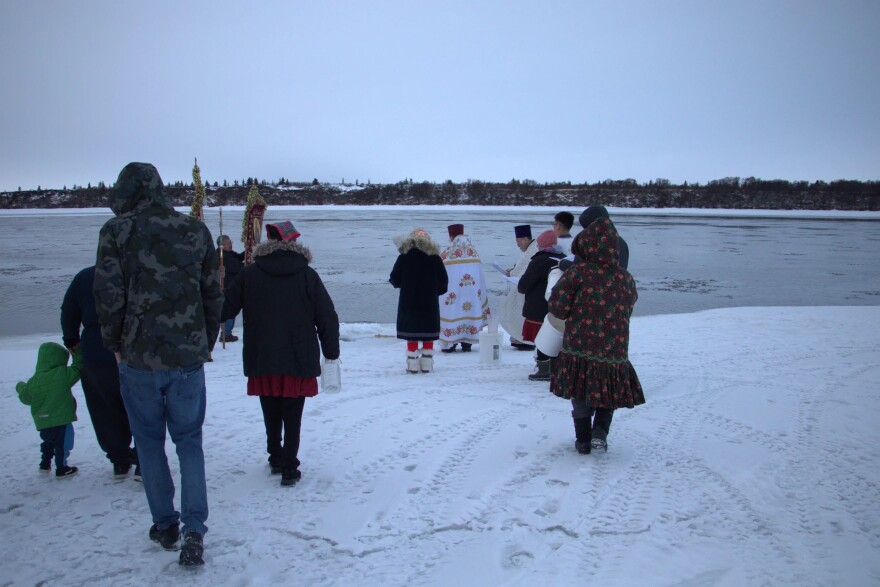The sun was just starting to rise at 9 a.m. on a recent January morning in Igiugig as Christina Salmon walked through the snow to her office in Igiugig's airport, where she works many jobs, including as a village council member. Igiugig, a community of about 70 people, sits on the Kvichak River which flows from Iliamna Lake, where Yup’ik, Dena’ina and Alutiiq peoples have lived for thousands of years.
Salmon said she almost feels like she can relax again.
“We've just wasted so much of our life fighting Pebble,” Salmon said.
Pebble Mine would be one of the largest copper and gold mines in the world — but it might never break ground. The U.S. Environmental Protection Agency is expected to soon issue its final decision on the mine.
And last month, Salmon got the news she was hoping for: The EPA recommended a ban on mining activities at the site, which is about 45 miles from her village. The recommendation would not only ban the mining activities described in the Pebble company’s permit, but any similar mining there.
If the EPA finalizes that decision at the end of the month, it would effectively kill the mine.
The EPA is exercising a rarely used authority under the Clean Water Act, commonly called its “ veto authority.” Some Bristol Bay tribes have pushed for this action since 2010. Agency officials declined to be interviewed for this story, but in a statement said the mine could harm fish spawning and breeding areas and that vetoing the mine would protect fisheries and a traditional way of life based on wild salmon.
The U.S. Army Corps of Engineers deniedPebble’s mining permit two years ago, but the company appealed that decision. Pebble spokesperson Mike Heatwole said the EPA is not following normal protocol by using this Clean Water Act authority before the appeal has even been processed.
“We continue to say that it is largely unlawful and unprecedented, what the EPA is attempting to do regarding this project,” he said.
Heatwole said the company may take this fight to the courts. But the EPA’s use of this authority reflects its serious concerns about the mine’s impact on the region, according to Joel Reynolds with the Natural Resources Defence Council.
“It's about as much opposition as one will ever see to a development project anywhere really, but in particular, in a development-friendly state like Alaska,” he said.
Many who want the mine to move forward say they understand the opposition to it, but they say the economic future of the region is at stake.
“I think the EPA should butt out, quite frankly, and let the process continue,” said George Hornberger, who runs the electrical utility in Newhalen, one of the communities closest to the proposed mine site. Hornberger said he's concerned about the mine's environmental risks, but that there needs to be other work opportunities in the region.
“If it's not that, then tell me your plan for this area,” he said. “What is your plan to bring economy into this area and give people a reason to stay here?”
Joanne Wassillie, the Newhalen Tribal Council administrator, believes Pebble can develop the mine safely. And she said earlier, when Pebble was exploring the site to see if a mine was viable, the company provided people with good-paying jobs.
“We saw a really positive change when our people were working,” she said. “And then it seems like as soon as they quit working we started noticing a lot more kind of like depression, no jobs, more alcohol- and drug-related activities happening.”
Wassillie said the prospect of good jobs would give people the ability to stay in the place they love. Now, they’re taking that upon themselves.
“We’re going to focus on: What can we do in Newhalen?” she said.
The Newhalen Tribal Council recently opened a grocery store, and it has a roads program to work with the city on maintenance. It's also helping some members who don't have driver’s licenses get them. Wassillie isn’t banking on Pebble; instead, she said, she and others are thinking outside of the box.
In Igiugig, Karl Hill, the tribe’s vice president, said he’s excited to focus on things like broadband efforts and a new cultural center.
“We do need projects that can bring money into our region and help to elevate our youth to higher levels of education,” he said. “So there is a need for it. But I think each project is a case-by-case basis, you know, and this one just doesn't fit.”
Hill said that over the years, debates around Pebble often relied on economic gains that can’t be weighed against culture and tradition.
“When you talk about a way of life, you can’t put numbers to it,” he said. “There is no ‘it’s worth a million, it’s worth a billion.’ We’re all having to integrate into the cash-based society. We still have this way of life that is subsistence, and there's no value you can put on that. It’s worth everything to people. ”
Get in touch with the author at izzy@kdlg.org or 907-842-2200.



